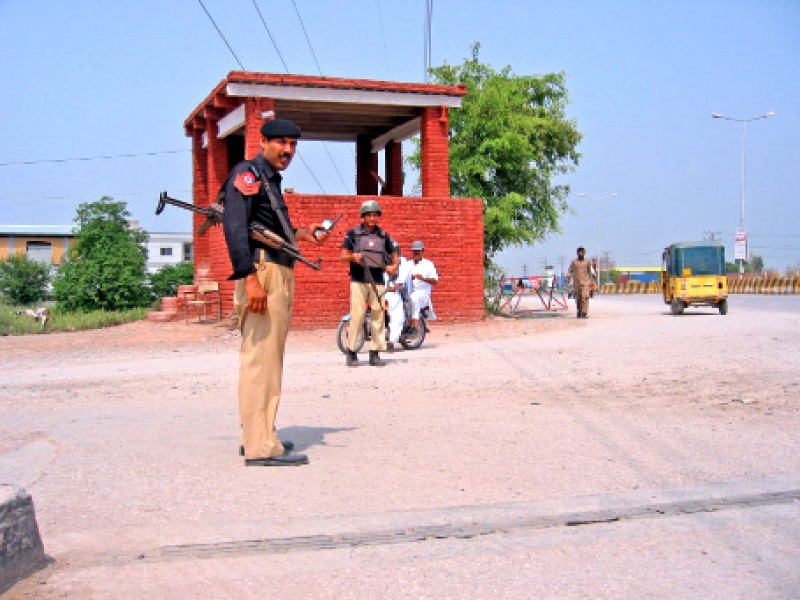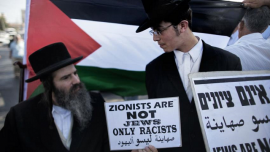
The scorching Peshawar sun raises temperatures up to 43 degrees Celsius. You lug around an eight kilogramme bullet-proof jacket, a steel helmet and a fully-loaded AK-47 that weighs about four kilogrammes. To make things a little more endearing, you stand guard by a roadside where thousands of vehicles cross daily and every sudden movement ceaselessly reminds of the imminent threat to your life hanging overhead.
This is a day in the life of a police constable in K-P who knows that he belongs to a force that has faced the brunt of the ‘war on terror’ for the past decade. Although the situation has improved insofar as the provision of combat gear, equipment and vehicles is concerned, the primary duty of a constable has not changed much.
Asad Khan’s life is a typical case in point. He is a Special Police Force constable who has been hired on contract and receives a fixed salary of Rs15,000 a month. Currently, Asad is deployed at a check post near Bhanamari police station and his duty is to guard the intersection of Ring Road and PAF Road; a duty that he performs with ferocious dedication.
“I come from a poor family,” said Asad. “My father and brother sell ice out of a small cabin in our ancestral village of Garhi Qamardin. I left them to join the police on contract three years ago.
“Like most other constables, I have to perform two shifts of six hours each day,” he explained. “I work from noon to 6pm and then again from midnight till 6am. This is a daily routine.”
After his day shift, Asad says he makes his way to a police establishment near the check post and falls asleep in preparation for the night shift. He adds that, as difficult as the routine was for him in the beginning, it has been drilled into him over the past three years.
“Once it becomes a habit, you stop feeling that you are wearing a bullet-proof jacket weighing over 8 kilogrammes; you forget the hefty helmet on your head and the AK-47 becomes an extension of your arm,” he said, “Guarding the streets in summer afternoons when the heat forces every soul to retreat to the shade of their homes to avoid the possibility of sunstroke, is not an uphill task anymore.”
The only relief for the constables comes from the small plastic umbrellas provided at the posts where policemen stand guard to check vehicles. There are two small rooms near the junction where Asad performs his duties. Such rooms are being built across the province; a region where the yearly temperatures can oscillate between 48 degrees Celsius to below freezing levels.
“After the completion of my night shift, I go home for a few hours each morning,” says Asad. “Otherwise the rest of my day is spent at the post. There are many others who have it substantially more difficult than me, because I am a local and not yet married.”
“Checking every vehicle plying the road is also problematic, as thousands of vehicle cross this post, where there is a staff of just eight people out of whom one or two are always on leave,” said the constable. “Either way, we have much more fatal enemies to face than the weather.”
Asad’s immediate supervisor Head Constable Gul Muhammad is a resident of Chagharmatti, a small village on the outskirts of Peshawar.
“I joined the force eight years ago,” says Gul. “I have two girls and a boy named Haris, but I can only go to my wife and children once a week. The rest of my time I spend at the check post.
“It is not an easy life. There is no electricity in these newly-built one-room buildings at the post, but we are lucky enough to have an old police building around half a kilometre away which is more comfortable and has electricity.
“Our duty is such that we have to be here through the shivering rain and the melting sun,” said Gul. “And the equipment that we have to work with is very basic.”
The time-tested constable, however, has manned much more dangerous areas, like the Manzoor Shaheed Check Post in Sarband, which borders Khyber Agency.
“I have defended posts where there is sniper activity throughout the day and attacks by militants in the dark of the night,” recounts Gul. “You cannot imagine the tension involved in guarding such areas. You cannot expose yourself for more than four or five minutes for fear of a bullet aimed at your head.”
Although the exposure to danger for both men has varied over the years, Asad and Gul seem to have one thing in common: both maintain a firm belief that these testing times will pass one day, and peace will prevail over their homes once again.
Published in The Express Tribune, August 10th, 2014.
COMMENTS (1)
Comments are moderated and generally will be posted if they are on-topic and not abusive.
For more information, please see our Comments FAQ

















Salute to these brave souls